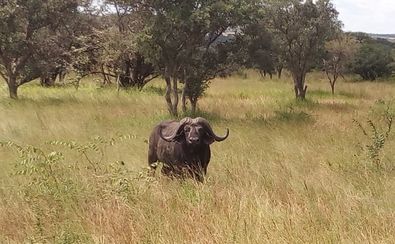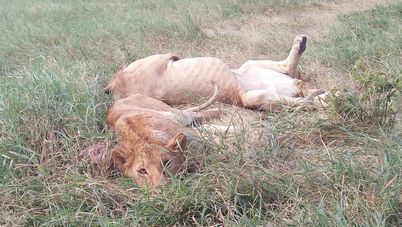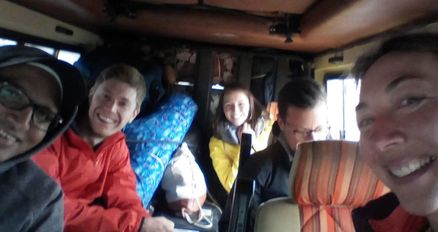|
I had the privilege of joining a camping safari here in Tanzania with four strangers, at least that’s how they started out, now they’re good friends. That’s what happens when you rough it for a couple of nights – you’ll ether want to hug or stab your companions after sharing just a few hours in a small confined space. It’s the combination of the closeness, lack of showers, only very basic toilet facilities with … umm.. interesting odours and night sounds coming from predatory animals and humans which, let’s face it, are sleeping practically next to you with only a thin bit of tarpaulin. That’s the humans by the way, to the best of my knowledge…  Yes, I'm looking at you Yes, I'm looking at you Beauty and Wildebeest Pikilily’s HQ is on the shores of the southern part of Lake Victoria and about three hours' drive away from the Serengeti and Ngorongoro crater. The former most have heard of but the latter not so many, which is a shame really because it really got my existential juices going. This phenomenal crater is a giant extinct caldera, an inactive volcano about 12 miles wide that erupted around 2-3 million years ago. It’s HUGE and BEAUTIFUL (caps for emphasis, not shouting) and inside is a very concentrated population of wild animals ranging from ostriches to zebras, lions and cheetahs and.. it goes on and on. They’re all wandering around together in this massive space, some, like the wilderbeest, majestically sweeping in and out from the plains of the Serengeti during the migratory seasons. Oh Mr Attenborough, your voice was my constant companion.  I also am looking at you, but not in the same way I also am looking at you, but not in the same way I felt a little sad though, as we moved through the reserve on well-driven and pre-defined tracks. It’s good to protect these animals but the crater felt a bit like a Florida theme park, whereas the Serengeti felt more open and wild, covering as it does such a vast area it is mostly left to nature and the animals have a place to hide from us. The other thing that made me a bit melancholy is the history of the area and the forced eviction not once, but twice of the Maasai and other tribes from their homes in the Serengeti and the crater by the Colonial British and Kenyan and Tanzanian governments. Laws and Acts as recent as 2009 have displaced many. Of course, the reason is the protection of the conservation area and wildlife, which helps the economy of the country. As usual, there’s more than one dimension to consider before any judgement. I think I read in The Four Noble Truths (Buddhist text) that ‘all suffering is resistance to what is’, so no point in being sad about anything for very long, this just are as they are. I believe if you encounter anything in life you don’t like, you have two options. You can either change it or accept it. Some say you have a third, you can remove yourself from it. Perhaps, but that doesn’t necessarily remove the suffering and can cause a lot of hassle as you find you have to move house often, which is a shed load of suffering, believe me, so I tend to just go with the two.  Ramesh, Timo, Dana, Marco and me. I only assaulted Timo once, during the Tze Tze fly 'incident'... Ramesh, Timo, Dana, Marco and me. I only assaulted Timo once, during the Tze Tze fly 'incident'... Doctor and the beat My fellow safari companions were excellent company, Timo and Dana from Germany, students on an internship teaching languages and maths at a local school, Marco – also from Germany working for DHL marketing, and Ramesh, a paediatric cardiologist from the University of Pennsylvania, here teaching doctors and raising awareness. We got to talking about a huge variety of subjects during this time, from our own African experiences and observations to astronomy, politics, technology (particularly built in obsolescence of equipment, something I think stinks), to music and culture and neuroscience. Timo was telling me about a music session he had structured for the children that involved him teaching them a simple melody to repeat. They just couldn’t get to grips with it – not even repeating a single note in tune. Eventually he came to the conclusion that it was simply that they had not a concept of the structure of western music. He told me that most popular music we listen to is the same few songs rehashed, with just a handful of different rhythms and different order of notes but essentially you can almost predict what will happen next. This genericization of western music has in fact been proven scientifically. But for the children in this class, their music was that of Africa, their mother’s music, chanting and jumping and making sounds up in whatever order they wished to express themselves. It was about the joy of life. They did not want anything orderly that sounded like scales or to repeat in rote a line of a song. This was not fun, this was a chore! It was an eye opener to him and me as he repeated his story. Talk to me, like superpowers do.. You know, I think that lesson was immensely valuable for the simple way it demonstrated the different ways of thinking between peoples, brought about because of our nurture and environment. If we can be this far apart in music, just think how many other schemas of understanding are different between two separate cultures? Now throw in all the cultures of the world. It’s a wonder we haven’t blown each other sky high already! Some say it will be a misunderstanding that will be the end of humanity, indeed there are special hotlines between countries just to try to avoid this happening. In 1963 Kennedy and Khrushchev set one up to avoid unintended nuclear war. It’s not actually a telephone, more of a data link. Hopefully they use more than dial up speed. Other countries have the same thing of course, in fact only a month ago Japan and China signed a pact to set up a hotline between them to avoid military action against each other’s vessels or aircraft in and around disputed islands in the East China Sea. That pact states the hotline to be in operation by June 10th 2018… in fact, a few days from today. I wonder if it’ll make the news? Possibly not, it doesn’t involve Trump or kittens falling off things. We owe this man.. pretty much everything This leads me neatly on to one of my heroes, Vasili Alexandrovich Arkhipov, a Soviet Naval Officer in the second world war who certainly saved us from nuclear war and possibly saved the world. I’m not even exaggerating a teeny bit. Vasili was second in command of a nuclear sub during the tense stages of the Cuban missile crisis. His sub had lost communication with Moscow after sinking low to avoid depth charges sent down by US Destroyers designed to make the sub come to the surface. In this communications blackout, the captain of the sub decided that war had broken out up above and wanted to launch a nuclear missile. Unusually for a soviet sub, three officers had to agree unanimously to authorise a nuclear launch (it was usually only the commander's sole decision). Arkhipov was the only one to disagree (which he did vehemently) and therefore instead of launching a strike, the sub eventually surfaced. If you do look up Vasili on the web, which I really hope you do, as well as share this story (just the story is fine, I’m not asking for a FB share, just that this guy is remembered), also read about the K-19 incident. A nuclear meltdown on a sub that was avoided through personal sacrifice of the crew who were all exposed to terrible doses of radiation that would either kill them pretty much immediately or lead them to an early death. We don’t know much about this man’s private life, only his wife’s description of him as ‘intelligent, polite and very calm’. Traits we need in people in positions of responsibility, don't you think? Code for Unexpected Encounters at Sea (CUES), is the procedure is used by nations to help overcome communication errors.
2 Comments
Neil Wiese
7/6/2018 03:17:56 pm
Thank you for the colour and thoughtfulness you've put into this. Reading it has taken me away from the asphalt and noise of London, to a peaceful place. And, yes, so-called Western music, as much as we in the west love it, is one dimensional withn the global family of music, although mergence is on the rise. Continued adventure and awareness.
Reply
Leave a Reply. |
archives
April 2023
Categories
All
|
 RSS Feed
RSS Feed